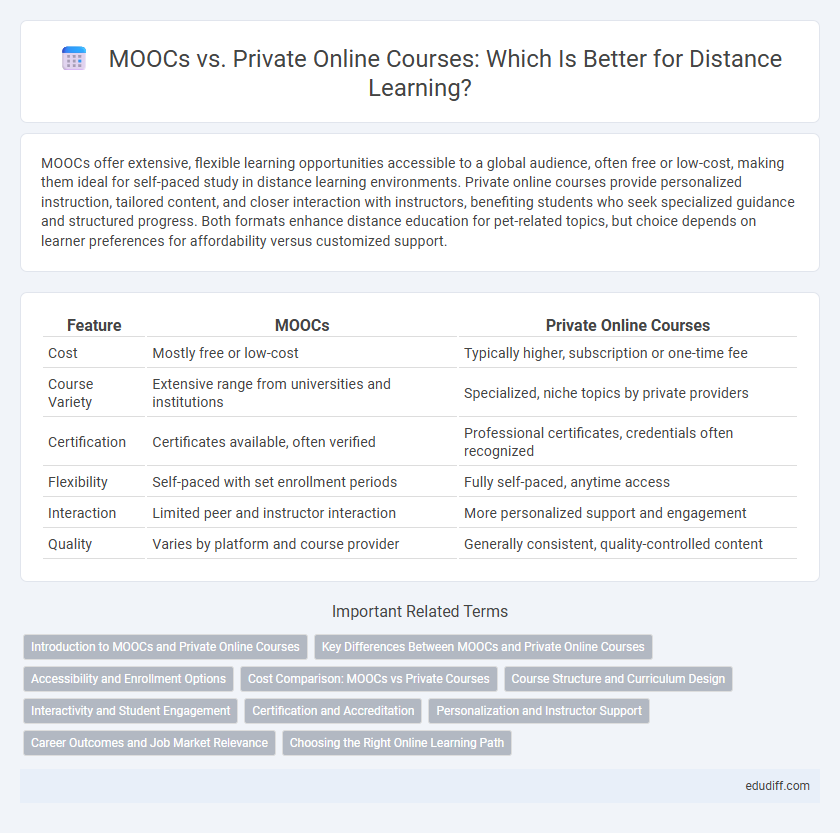MOOCs offer extensive, flexible learning opportunities accessible to a global audience, often free or low-cost, making them ideal for self-paced study in distance learning environments. Private online courses provide personalized instruction, tailored content, and closer interaction with instructors, benefiting students who seek specialized guidance and structured progress. Both formats enhance distance education for pet-related topics, but choice depends on learner preferences for affordability versus customized support.
Table of Comparison
| Feature | MOOCs | Private Online Courses |
|---|---|---|
| Cost | Mostly free or low-cost | Typically higher, subscription or one-time fee |
| Course Variety | Extensive range from universities and institutions | Specialized, niche topics by private providers |
| Certification | Certificates available, often verified | Professional certificates, credentials often recognized |
| Flexibility | Self-paced with set enrollment periods | Fully self-paced, anytime access |
| Interaction | Limited peer and instructor interaction | More personalized support and engagement |
| Quality | Varies by platform and course provider | Generally consistent, quality-controlled content |
Introduction to MOOCs and Private Online Courses
MOOCs (Massive Open Online Courses) offer free or low-cost access to a wide range of subjects with flexible pacing, designed for large-scale participation across the globe. Private online courses typically involve personalized instruction, smaller class sizes, and often provide direct mentorship or certification tailored to specific professional skills. Both platforms leverage distance education technology but differ in scope, accessibility, and interaction levels to meet diverse learner needs.
Key Differences Between MOOCs and Private Online Courses
MOOCs (Massive Open Online Courses) offer free or low-cost access to courses from top universities with open enrollment and flexible schedules, serving thousands of learners simultaneously. Private online courses provide tailored, instructor-led training with limited enrollment, focused on specialized topics or company-specific needs, often including personalized feedback and certification. The scalability, cost structure, and level of personalization distinguish MOOCs from private online courses in distance education.
Accessibility and Enrollment Options
MOOCs (Massive Open Online Courses) offer unparalleled accessibility with free or low-cost enrollment options available to millions worldwide, enabling learners from diverse backgrounds to join without geographic or financial barriers. Private online courses typically require paid enrollment and may enforce stricter admission criteria, limiting access to a smaller, more targeted audience. The scalability of MOOCs supports open participation, while private courses often provide personalized, exclusive content tailored to specific learner needs.
Cost Comparison: MOOCs vs Private Courses
MOOCs often provide free or low-cost access to high-quality educational content from top universities, making them a budget-friendly option for learners worldwide. Private online courses typically require higher fees, reflecting personalized instruction, certification, and specialized resources. The cost-benefit analysis favors MOOCs for affordability, while private courses offer investment in tailored learning experiences.
Course Structure and Curriculum Design
MOOCs typically offer standardized course structures with predefined modules and assessments designed to accommodate large, diverse populations. Private online courses often feature customizable curricula tailored to specific learner needs, allowing for more flexible pacing and specialized content. Both formats utilize multimedia resources, but private courses may integrate interactive elements and personalized feedback more extensively to enhance learner engagement.
Interactivity and Student Engagement
MOOCs often face challenges with interactivity due to large class sizes and limited real-time feedback, which can diminish student engagement. Private online courses typically offer smaller cohorts and personalized interaction through live sessions or direct instructor access, enhancing active participation. Higher engagement in private courses correlates with improved knowledge retention and course completion rates.
Certification and Accreditation
MOOCs often provide certification recognized by educational institutions and employers, supported by partnerships with accredited universities and organizations. Private online courses may offer certificates of completion, but these frequently lack formal accreditation and industry recognition. Accreditation from reputable bodies enhances the value of certifications, making MOOCs a preferred choice for learners seeking credible credentials.
Personalization and Instructor Support
MOOCs often provide scalable learning experiences with limited personalization and instructor interaction, relying heavily on automated assessments and peer forums. Private online courses offer tailored content and direct instructor support, enabling customized feedback and adaptive learning paths. Enhanced personalization in private courses significantly improves learner engagement and outcomes compared to the standardized approach of MOOCs.
Career Outcomes and Job Market Relevance
MOOCs offer wide access to industry-aligned skills but often lack personalized mentorship and networking crucial for career advancement, whereas private online courses provide tailored curricula and direct industry connections that enhance job market relevance. Employers increasingly recognize certificates from accredited private platforms due to their rigorous assessments and specialized training modules. Career outcomes improve significantly when learners engage with platforms that incorporate real-world projects and employer collaborations, bridging skill gaps more effectively than general MOOC offerings.
Choosing the Right Online Learning Path
Choosing between MOOCs and private online courses depends on your learning goals, budget, and desired level of interaction. MOOCs offer flexible, often free access to university-level content with a broad range of subjects, ideal for self-motivated learners seeking foundational knowledge. In contrast, private online courses provide personalized instruction, tailored feedback, and in-depth specialization, making them suitable for professionals targeting specific skill advancement or certification.
MOOCs vs Private online courses Infographic

 edudiff.com
edudiff.com